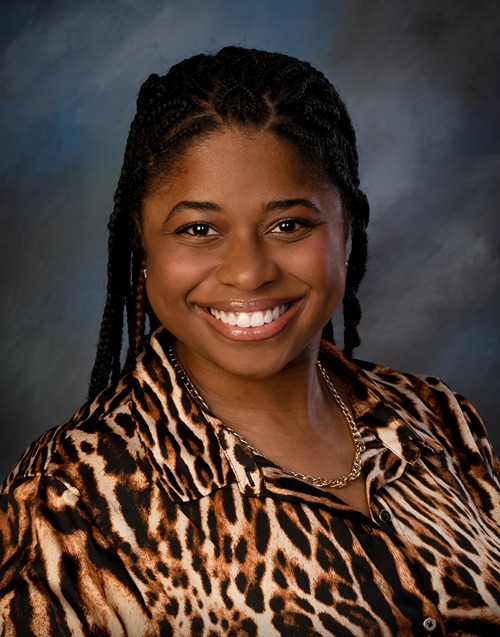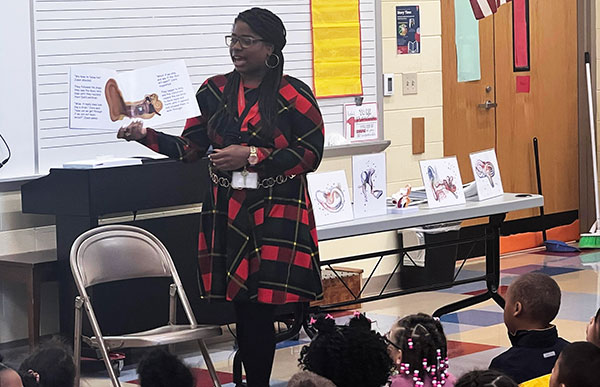 Jocelyn Tubbs AuD ‘19 is incredibly passionate about ear health.
Jocelyn Tubbs AuD ‘19 is incredibly passionate about ear health.
That passion is only surpassed by her passion for educating others on the importance of ear health, which she realized during her residency in Cleveland, Ohio, ahead of her graduation from Pacific University’s School of Audiology.
“When I was explaining hearing test results, I realized that the majority of the population has no idea what hair cells are, what cochleae are, middle ear versus inner ear,” Tubbs said. “I wondered if there was a way to explain this to people where they would get it.”
Question and curiosity inspired Tubbs to write a children’s book, A Sound Adventure, which was independently published in 2020. The book documents the musical journey of Jason and Clara into their dad’s ear, unlocking the mysteries of sound.
Identified as an author to look out for in 2023 by LA Weekly magazine, Tubbs hopes the book will get children and adults talking about the importance of ear health and take a step toward breaking down the stigma of younger people wearing hearing aids.
“Braces and glasses are more acceptable when we are younger than hearing aids are,” said Tubbs, who now practices in Greeley, Colorado. “It’s just so weird to see that stigma. It’s just a sensory deficit. It’s a sense that we should be talking about.”
While she remembers struggling with swimmer’s ear as a child, Tubbs’ interest in the ear and audiology did not make waves until her time as an undergraduate at Bowling Green University. While initially interested in speech therapy and pathology, the passion of a lecturing audiologist sparked an interest in learning more about the ear.
She became intrigued about how ear health can affect so many other systems and conditions in the body. That led Tubbs to take her degree in communication sciences and disorders to Oregon, where she entered the School of Audiology’s three-year accelerated program.
While the move from Ohio to the Pacific Northwest was a leap of faith, Pacific’s faculty quickly showed Tubbs that she was in the right place. She still keeps in touch with a select group of professors that she affectionately calls her “Fairy AuD Parents.”
“It’s a culture shock, moving from Ohio to Oregon. It’s also very different being the only Black audiology student in a class of 27,” Tubbs said. “I didn’t know if I was going to make it through my first semester. But they would hold their office hours for me. They would study with me. I’m so thankful for those guys because I probably would have dropped out. I’m so happy that I didn’t.”
 Pacific’s faculty also reminded Tubbs that to be the best doctor, she simply needed to be herself. “Patients can always tell when you are quoting from a book or a website,” she said. “They want to know your thoughts on what you are doing. Be the professional.”
Pacific’s faculty also reminded Tubbs that to be the best doctor, she simply needed to be herself. “Patients can always tell when you are quoting from a book or a website,” she said. “They want to know your thoughts on what you are doing. Be the professional.”
Along with battling the stigma of hearing aids and ear health, Tubbs is also passionate about battling the stigmas of Black people in a profession that is predominantly white. According to a 2019 study by the American Speech-Language-Hearing Association, 92% of audiologists are white with just 2% identifying as Black.
The lack of diversity that Tubbs saw in the profession led her to create Black Audiologists United, a Facebook group dedicated to providing opportunities for connection in the profession. The group now has over 200 members as well as other professionals who don’t subscribe to social media. In addition to providing an online safe space, Tubbs and BAU facilitate networking opportunities at regional and national conferences.
Tubbs also presents at conferences on the history of Black people in the U.S. and the importance of building diversity not only among doctors of audiology but also among the base of patients that audiologists see.
Her work in building diversity has been featured by the American Academy of Audiology and has been referenced in national media, stressing the importance of representation and diversity in healthcare.
Not only has Tubbs worked to increase the awareness of Black people in the profession, but she also uses her practice to encourage Black patients to put trust in a medical system they have learned over the decades to be mistrustful of.
“Black people don’t go to specialists. They don’t get routine check-ups. In my own family, it is so hard to get my elders to just get regular check-ups because of all that Black people went through behind the scenes during segregation,” Tubbs said.
“When I see a Black patient, I try to ask when they last saw their primary care doctor. I am asking about their overall health. If anything sounds off, I tell them to see their primary before they come back. I should not be the only doctor they see.”
It’s all part of an effort to make sure that people of all races, all ages, all walks of life have what they need for a better quality of life.
For Jocelyn Tubbs, it all starts with the ears.
"When you can give someone the ability to live a better quality of life with just a quick appointment, it's amazing how much they truly realize. I love getting that person to see that there is light at the end of the tunnel. I appreciate when patients tell me how much their life has changed."